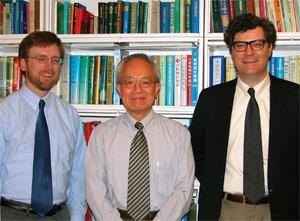Profiles
- Contact: Website Administrator
- 2/1/2005
Jayachandran N. Variyam

It's relatively recently that economists have turned their attention to the widespread phenomenon of obesity among Americans. ERS senior economist Jay Variyam has tackled the issue head-on with the tools of his trade, mining voluminous data sets from USDA and other government sources to shed light on the reasons for consumers' dietary choices. He has, for example, looked at the role of nutrition knowledge in the quality of adult and child diets. 'The nature of this relationship,' asserts Jay, 'is a key question for policymakers designing nutrition education programs.' Among Jay's findings: mothers' knowledge of nutrition has a positive effect on the quality of preschoolers' diets, but less so on nutritional intake among older children.
In 2003, Jay organized a workshop on the Economics of Obesity, cohosted by ERS and the University of Chicago and attended by analysts from the National Institutes of Health, Food and Drug Administration, Council of Economic Advisors, and other agencies. Economists from major academic institutions presented an overview of leading research on the causes and consequences of obesity. The article by Jay, The Price is Right: Economics and the Rise in Obesity, draws on the discussions.
Jay's work covers nutritional well-being in general as well as obesity prevention. How, for example, have the now-familiar nutrition labels affected diets? Jay found a noticeable impact on consumption of fiber and iron. And what if mandatory nutrition labeling were extended to restaurants? In a forthcoming study, Jay assesses potential benefits and costs of such a law.
He has published articles in a number of economics and nutrition-related journals, including the American Journal of Agricultural Economics, American Journal of Preventive Medicine, and the Journal of Nutrition Education. He is called upon by other government entities to help formulate surveys on health and nutrition. For the Centers for Disease Control and Prevention (CDC), he led the effort to insert a set of questions probing consumers' diet/health knowledge into the 2005-06 National Health and Nutrition Examination Surveys
Jay's current work includes a study of health and health care access among U.S. farmers and agricultural workers, which will help policymakers to better assess well-being in the farm sector.
ERS China Team

U.S. agriculture has a deep interest in China, the world's fastest-growing economy and largest producer and consumer of a wide range of commodities. Economic developments and policy changes in China often spill over into world markets, affecting prices and export opportunities for U.S. farmers. This ripple effect makes it increasingly important to understand the impact of changing policies, market institutions, and trends in consumer demand in China.
ERS's China Team is a leading source of research and information on China's agricultural policy, commodity outlook, and trade. The team comprises full-time members Francis Tuan, Fred Gale, and Bryan Lohmar, but many other economists from ERS, other USDA agencies, universities, and research organizations have joined them on issue-oriented research projects. The team periodically leads USDA delegations on visits to China, and its members have briefed officials in USDA, the State Department, the Office of the U.S. Trade Representative, Congress, and the White House on research findings.
With support from USDA's Emerging Markets Program, the ERS China Team has carried out a successful exchange program between USDA and Chinese agricultural economists and other analysts focused on improving market analysis and creating an agriculture information system in China. These exchanges, says Tuan, the team's leader, 'have helped ERS establish contacts with Chinese officials, agribusiness managers, and others with firsthand information on policy developments and unpublished data.'
The China Team has produced an extensive body of work, most of which can be accessed on the ERS website. Recent reports have analyzed China's changing retail food sector, as well as developments in the country' s oilseeds and grains markets, particularly as they may present opportunities for U.S. exports. The team is currently expanding the scope of its analysis to include fundamental drivers of agricultural trade in China, such as biotech policy; water availability; markets for land, labor, and credit; and changing consumption patterns.

